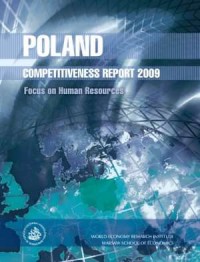Poland. Competitiveness Raport 2009. Focus on Human Resources
Marzenna A. Weresa
(red.)
| Dane szczegółowe: | |
| Wydawca: | Szkoła Główna Handlowa w Warszawie |
| Rok wyd.: | 2009 |
| Ilość stron: | 314 s. |
| Wymiar: | 167x240 mm |
| EAN: | 9788373784482 |
| ISBN: | 978-83-7378-448-2 |
| Data: | 2010-04-21 |
Opis książki:
The uncertainty of the current economic outlook at a time of global fi nancial crisis demands a clear understanding of how Poland prospered in 2008, compared with other EU countries; where its economic performance fell short, and what challenges Poland will face in 2009. This report, which is the 2009 edition of Poland’s Competitiveness Reports published every year by the World Economy Research Institute, compares various aspects of Poland’s competitiveness with those of other EU countries in 2008, with a special focus on human resources. The cross-country comparison is conducted using both quantitative and qualitative perspectives. On this basis, it is possible to forecast future trends and indicate some areas of policy priorities. The analyses in this report are based on the broad concept of competitiveness, defi ned here as a country’s ability to achieve a sustainable increase in living standards, along with an improvement in its role in the global marketplace and an increase in its investment attractiveness. The structure of the report corresponds to this defi nition. Chapter 1 focuses on comparative economic performance, benchmarking Poland’s performance against those of other European Union member states, using various economic and social indicators such as GDP growth trends, income convergence and disparities, and the level of poverty in the country. Chapter 2 follows up with an assessment of the competitive position of Poland’s economy in external economic relations, in particular the ability of Polish fi rms to achieve success in international markets, including the EU common market, supplemented by what a country Leeds to attract foreign investment. Chapters 3 and 4 provide an in-depth analysis of factors that determined shifts in Poland’s competitiveness in 2008. These determinants are grouped into two categories: assets and their productivity; and policies together with institutions, their effectiveness and quality. Chapter 5 synthesizes the fi ndings of the previous sections of the report, providing a tentative assessment of the overall competitive position of Poland’s economy in 2008 and highlighting its major strengths,weaknesses and challenges. In a globalized knowledge-based economy, competitiveness has few alternatives except to build on human capital. Therefore, the special focus of the 2009 edition of this report is the availability and quality of human resources in Poland. Knowledge is critical for productivity growth. It also determines competitive advantages in the international environment. Furthermore, knowledge is transferred into educational attainment, which contributes to social cohesion. All these aspects of human resources and their development are analyzed in the context of Poland’s competitiveness In Chapters 6 and 7. The last part of the report offers tentative conclusions about ways of expanding Poland’s national capacity for competitiveness at a time of global crisis and economic recession. It is often said that a crisis can be an opportunity and an incentive for changes that help overcome constraints. Will Poland be able to look beyond its shortterm needs and build its competitive potential on the basis of an appropriate institutional framework, innovation and human resources? This report contributes to the debate on this critical question.
Marzenna Anna Weresa
Książka "Poland. Competitiveness Raport 2009. Focus on Human Resources" - Marzenna A. Weresa (red.) - Wydawnictwo Szkoła Główna Handlowa w Warszawie. Książka posiada 314 stron i została wydana w 2009 r.
Spis treści:
Executive summary
PART I
POLAND’S COMPARATIVE ECONOMIC PERFORMANCE AND COMPETITIVE POSITION IN 2008
Chapter 1
Economic Development and Its Convergence
1.1. Comparative Analysis of Economic Performance in 2008
Mariusz Próchniak & Ryszard Rapacki
1.2. Real Convergence or Divergence in the GDP Per Capita
Mariusz Próchniak
1.3. Income Inequality and Poverty in Poland
Patrycja Graca-Gelert
Chapter 2
Competitive Position in External Economic Relations
2.1. Poland’s Foreign Trade Performance in 2008
Józef Misala
2.2. Poland’s Competitiveness in Trade with Other European Union Countries
Józef Misala
2.3. Poland’s Intra-Industry Trade with the European Union in 2000-2007
Elżbieta Czarny & Katarzyna Śledziewska
2.4. Foreign Direct Investment (FDI) and Poland’s Competitiveness
Marzenna A. Weresa
PART II
DETERMINANTS OF POLAND’S COMPETITIVENESS IN 2008
Chapter 3
Assets and Their Productivity
3.1. Development of Human Resources
Mateusz Mokrogulski
3.2. Physical Capital and Its Productivity
Piotr Maszczyk
3.3. Infrastructure
Ireneusz Bil
3.4. Science, Technology and Innovation
Beata Michorowska
3.5. Total Factor Productivity
Mariusz Próchniak
Chapter 4
Policies and Institutions and Their Quality
4.1. Political and Social Environment
Janusz Gołębiowski
4.2. Economic Policy Assessment
Jan Bossak
4.3. Financial System and Capital Market Developments
Oskar Kowalewski
Chapter 5
Positioning Poland in the EU
5.1. Poland’s Competitiveness According to the Institute for Management
Development (IMD) and the World Economic Forum (WEF)
Bogdan Radomski
5.2. Overall Assessment of Poland’s Competitiveness and Its Drivers in 2008
Marzenna A. Weresa & Ryszard Rapacki
5.3. SWOT Analysis of Poland’s Competitive Position in 2008
Ryszard Rapacki
PART III
HUMAN CAPITAL AND POLAND’S COMPETITIVENESS
Chapter 6
Knowledge as a Base for Human Resources Development: The Case of Poland
6.1. Knowledge Creation and Protection in Poland: Implications for the Development of Human Resources
Andreas Bielig
6.2. Human Resources in Poland’s R&D Sector
Renata Zagórska
6.3. Is There Currently a Shortage of Engineers in Poland?
Agnieszka Gryzik
6.4. Managers’ Knowledge Orientation as a Component of Human Capital and Its Effect on Business Performance
Jolanta Mazur
Chapter 7
Human Capital and Its Role in Building Poland’s Competitiveness
7.1. Human and Social Capital in Poland and the Country’s Competitiveness
Tomasz Dołęgowski & Michał Spychalski
7.2. The Health Status of Society and the Growth of Human Capital in Poland
Ewelina Nojszewska
7.3. Human Resources and the Competitiveness of Polish Firms
Tomasz Gołębiowski & Małgorzata Lewandowska
Concluding Remarks
Marzenna Anna Weresa
Statistical annex
Filip Kamiński

